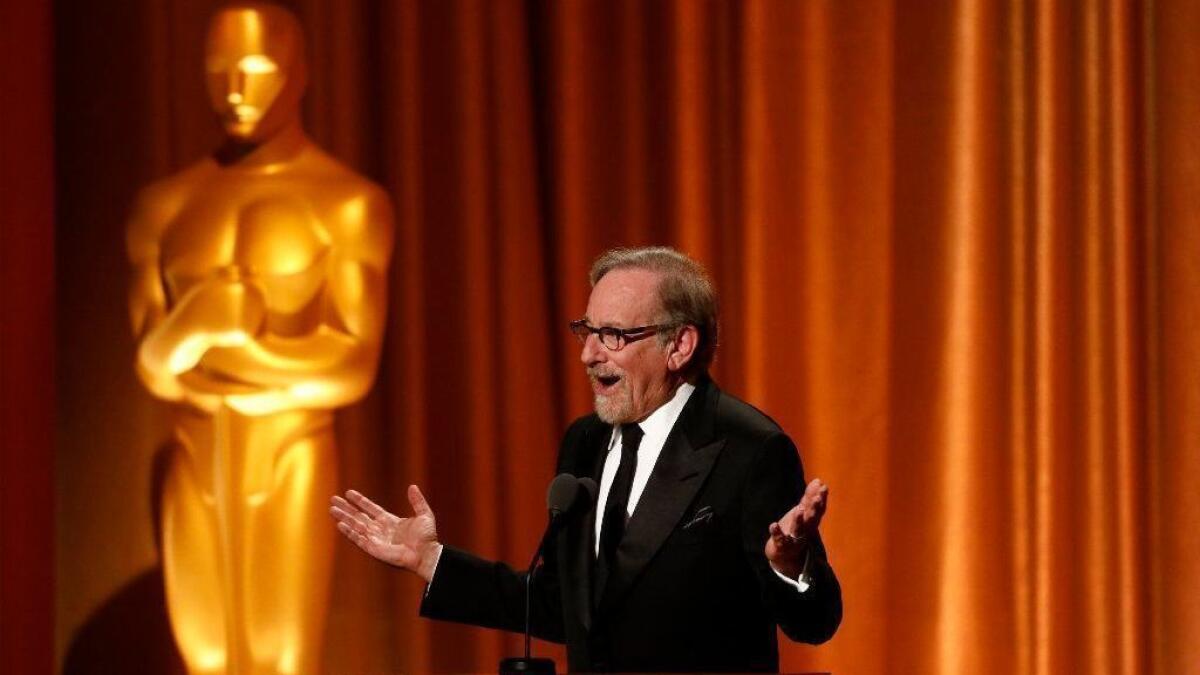Column: Is Netflix getting too powerful? And is Spielberg the man to save us?

- Share via
When I read headlines that Steven Spielberg was “at war” with Netflix, I burst out laughing.
First of all, that “war” appears to consist of Spielberg planning to suggest that any film Netflix produces or distributes have a four-week theatrical release before being considered for an Oscar. He’s not circulating a petition among his friends to Never Work for Netflix or demanding the streamer release its viewership numbers or tax returns.
Netflix slapped back, suggesting it is a populist institution that makes cinema available to those who live in towns without theaters. Which is pretty hilarious considering that one of the reasons small movie theaters are dying is … Netflix.
But it is also hilarious that it’s Spielberg who, in the parlance of the coverage, is going to battle. I recently watched portions of the Wim Wenders film “Room 666,” in which Wenders brought filmmakers one by one into a hotel room during the 1982 Cannes Film Festival to ask if cinema was dead.
Directors such as Jean-Luc Godard and Rainer Werner Fassbinder waxed eloquent about the meaning of cinema, but Spielberg leaned back in his chair and spoke nonstop about money. About how expensive filmmaking was, about how he would have never been able to make “Jaws” at that time, what with inflation and the desire by studios to make sure they got a big return on their investments.
He had a point back then, but his past protest seems at odds with his current perceived “anti-Netflix” stance. Netflix is spending lots of money, lavishing it on all sorts of people with, seemingly, no strings attached.
Or maybe one string. One very big string. No matter what their reps may say at the moment, what Netflix really wants is to be able to win an Oscar for a film that is never released in theaters. They want to redefine cinema without the cinema. And that’s the string Spielberg wants to cut.
This is the part where I feel obliged to say that, like millions around the world, I love Netflix. I love much of their original content. I love when fabulous but underwatched shows are saved by the “Netflix bump.” I love how it has brought us the world and all its subtitles and launched a streaming industry that makes so many things available to me exactly when I want them. (Strangely, I could not find “Room 666” on any streamer.) I have the Netflix app on my phone, and I bought a new iPad just so I could utilize the new download feature.
But I also hate Netflix, sometimes more than a little. I hate how it launches the next episode before I can even check what time it is, how so many television writers seem obliged to add unnecessary minutes to their episodes just because they can, how much really crap TV it imports from other countries, especially Britain, how its “you might also like” algorithms seem presumptuous and nonsensical.
I also worry about the Ayn Rand-ness of it all — that Netflix is a superbug of capitalism, promising to release artists from the mundane world.
I am also a tiny bit afraid of Netflix; there’s something aggressively menacing about how it continues to gather into its fold so many talented makers of television and film. Netflix deals are announced on a nearly weekly basis, and though I rejoice whenever a person I admire gets the money and, one assumes, the freedom to tell great stories, I also worry about the Ayn Rand-ness of it all — that Netflix is a superbug of capitalism, promising to release artists from the mundane world while really creating a super-collective in some hidden location that will control technology and bring the world to its knees. (Which raises the question: Has anyone actually seen Ryan Murphy or Shonda Rhimes lately?)
Yes, Netflix and its fellow streamers are to be praised for their willingness and ability to fund and platform a much wider variety of storytellers than legacy television networks and film studios are doing. (And maybe those networks and studios should look more at the content and less at the digital platform as they attempt to compete.)
Still, monopolies are always troubling, especially when they involve art of any sort. As with Disney, Netflix is part of a consolidation of content in which a handful of big and highly profitable companies control the stories we tell and the stories we see.
Like Amazon and all the other streamers, Netflix is mostly in the business of convenience, and convenience can lead to mindless dependence. Spielberg may or may not succeed in forcing Netflix to support the traditional notion of cinema if it wants to win the industry’s biggest award, but by taking a stand, he’s at least forcing a discussion we should be having, not just about the difference between film and television, but about how dependent we should become on one platform or another.
I love Netflix, but it isn’t, and should never be, the only game in town.
Twitter: @marymacTV
More to Read
The biggest entertainment stories
Get our big stories about Hollywood, film, television, music, arts, culture and more right in your inbox as soon as they publish.
You may occasionally receive promotional content from the Los Angeles Times.











